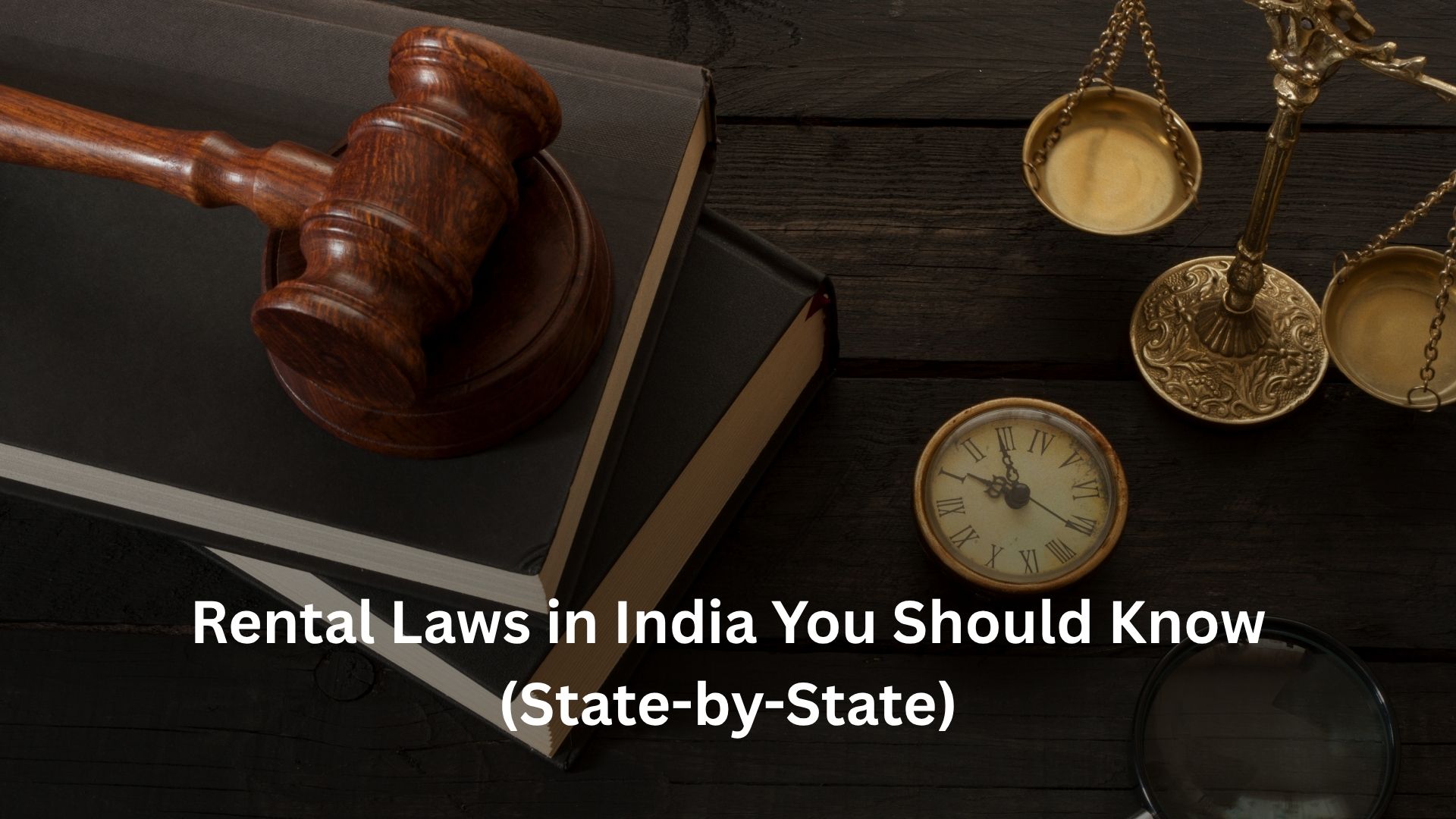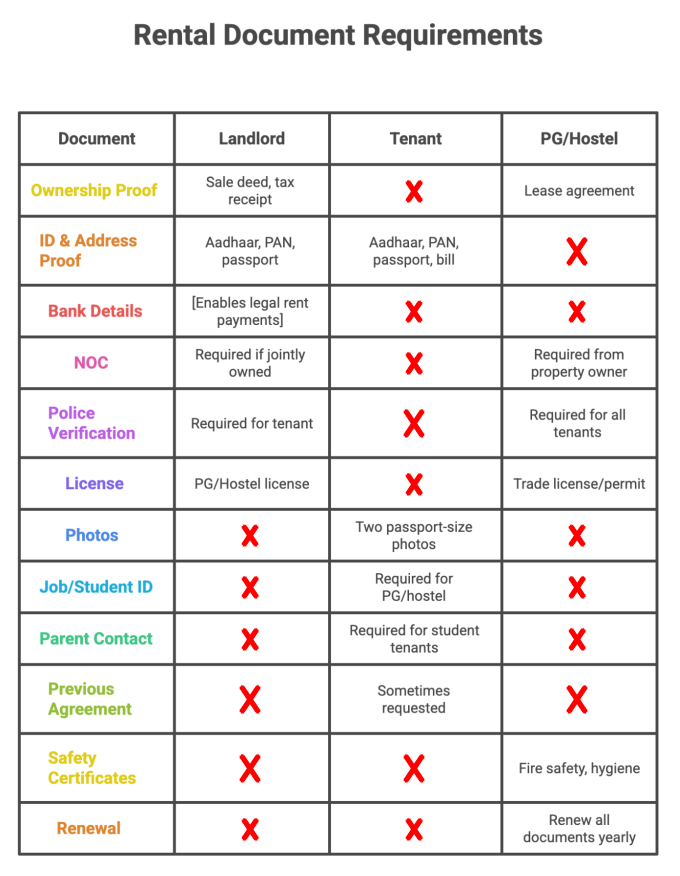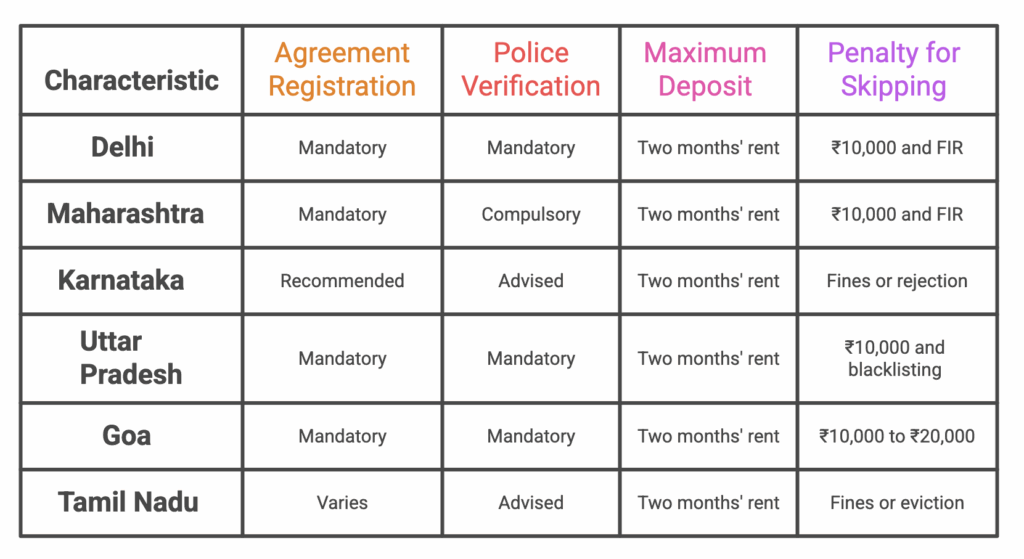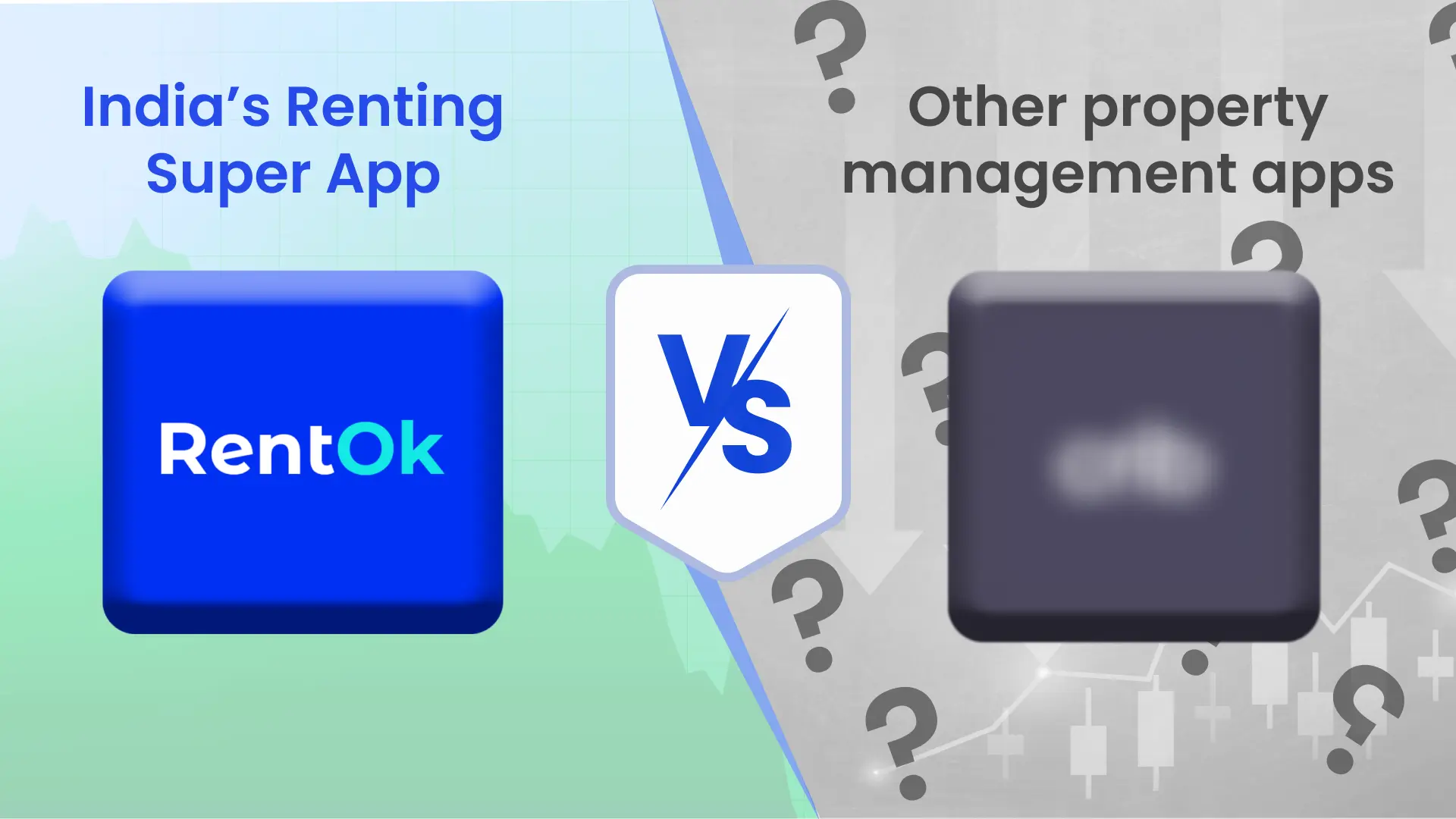Market Trends
Rental Laws in India You Should Know in 2025 (State-by-State)


Written by
Shivanshi Dheer
Read Time
10 min read
Posted on
November 10, 2025
Overview
Rental Laws in India You Should Know in 2025 (State-by-State)
Renting a home in India, whether it’s a flat, house, PG, hostel, or co-living room, has changed a lot in the past few years. Earlier, most people used simple paper rent agreements and gave rooms on trust. But now, the rental laws have become stricter to protect both landlords and tenants.
In 2025, most rental work happens online. You can make rent agreements, do police verification, and even pay rent digitally. But if you don’t follow the new rental laws, you can face heavy fines or legal problems.
This blog explains everything about rental laws in India, how they work across different states, and how you can stay safe as a landlord or tenant.
What Has Changed in Indian Rental Laws (2025)
The government wants renting to be transparent and safe for everyone.
Some of the big changes in rental laws are:
Indian Rental Rules (2025) – Simple Guide
The aim is to make renting clear, safe, and fair for everyone.
Here are the main points in easy terms:
1) Registered Agreement is a Must
You cannot rely on verbal or handwritten agreements anymore.
You must create a written rental agreement and get it registered.
Many states allow registration online.
Example: In Maharashtra, you register the agreement on the state’s online portal.
2) Security Deposit Limit
For residential homes, landlords cannot take more than two months’ rent as deposit.
Example: If rent is ₹10,000, deposit cannot be more than ₹20,000.(Commercial places may have different rules.)
3) Rent Increase Only Once a Year
Landlords can increase rent only once in 12 months.The percentage increase must be reasonable (commonly 5–10%) and written in the agreement.
This increase must be informed in advance.
4) Police Verification of Tenants
Tenants need to go through a verification process.This helps avoid illegal occupation and improves safety.Some cities do this online; others need physical forms.
5) Online / Digital Process
Many states now have online systems that let you:
- Make the agreement
- Register it
- Sign digitally
- Upload verification documents
This saves time and reduces paperwork.
6) Faster Handling of Disputes
There are special rent authorities or rent courts to solve rental disputes quickly.This includes issues like eviction, unpaid rent, and return of deposits.
Other Useful Points
- Rules can differ from one state to another. Always check your state’s policy.
- Landlords must give notice (often 24 hours) before entering the property.
- Deposits should be returned quickly (usually within 30 days) after adjusting for damages.
Important Documents Every Landlord Must Provide
Landlords have certain duties under Indian rental laws. They must keep proper documents ready before giving their property on rent.
Here’s what’s needed, with examples:
- Property Ownership Proof: Like sale deed or property tax receipt, to prove you own the place.
Example: Mr. Sharma renting his Gurgaon flat must show the sale deed in his name. - ID & Address Proof: Aadhaar, PAN, or passport to confirm identity.
- Bank Details: So the tenant can pay rent legally through online transfer or UPI.
- NOC (No Objection Certificate): Needed if the property is jointly owned.
- Police Verification Paper: This shows you’ve informed the police about the tenant.
- PG/Hostel License: If you’re running it commercially, you need a trade license.
Keeping all these papers ready helps the landlord follow rental laws properly and avoid any police or legal issue later.
Documents Tenants Must Give to Landlords
Tenants also have to follow the rental laws and give proper details.
Here’s what they should submit:
- Aadhaar, PAN, or Passport: For ID verification.
- Address Proof: Like electricity bill, job letter, or bank statement.
- Photos: Two passport-size photos.
- Job or Student ID: Especially for PG or hostel stays.
- Parent’s Contact Info: For student tenants, this is mandatory in many cities.
- Previous Rent Agreement: Sometimes landlords ask this for record.
Example: A student renting a room in Bangalore must show their college ID and Aadhaar before moving in.
Running a PG, Hostel, or Co-Living? Follow These Rental Rules
If you plan to lease a building for a PG or hostel, the rental laws are even stricter.
You must:
- Create a lease agreement that clearly says the property will be used as a PG or hostel.
- Take a No Objection Certificate (NOC) from the owner.
- Get a trade license or business permit from the city corporation.
- Have fire safety and hygiene certificates.
- Do police verification of all tenants.
- Renew all documents every year.
Example: If you open a girls’ PG in Chennai, the police will check safety arrangements before granting the verification certificate.

How to Make a Rent Agreement in 2025
A rent agreement is the most important document under rental laws.
Here’s what to include in your rent agreement checklist :
- Names, addresses, and phone numbers of both landlord and tenant
- Full property address
- Monthly rent and deposit details
- Rent payment date and mode (cash, bank, UPI)
- Duration of stay (usually 11 months)
- Notice period and early-leaving rules
- Annual rent increase rate
- Who pays for maintenance, water, and electricity
- Police verification details
- Two witnesses with ID proofs
- Mention if the agreement is made via a digital platform like RentOk
Having these points in your agreement protects both sides from future fights.
Step-by-Step Police Verification (Popular States)
Police verification one of the most important steps when it comes to onboarding a tenant as you never know who is actually living at your house and if god forbid something happens later police will know where they live and you will not be in the mess. Lets walk you through the step-wise guide for tenant police verification in different states.
Delhi
- Visit the Delhi Police Tenant Verification Portal or nearest police station.
- Fill out the tenant details, upload Aadhaar and rent agreement.
- Submit online or offline.
- Police may visit for confirmation.
- You’ll get a tenant verification certificate, which is valid till the agreement ends.
Example: In South Delhi, failure to submit the verification has led to ₹10,000 fines in many cases.
Maharashtra (Mumbai, Pune, Thane)
- Go to the Maharashtra Police online tenant form.
- Upload documents.
- Police verify within a few days and issue an acknowledgment slip.
- If you skip it, you can get a ₹10,000 fine or FIR under Section 188 IPC.
Karnataka (Bangalore)
- Use Karnataka One or visit your local police station.
- Fill the tenant details and upload your Aadhaar and agreement.
- The police verify and issue a receipt.
- Missing verification can lead to a fine or rejection of your future tenant applications.
Uttar Pradesh
- Use the UPCOP mobile app or go to a police station.
- Submit the tenant form with ID and agreement.
- Police maintain a digital record.
- A fine of ₹10,000 is imposed, and the property is marked as “risky.”
Tamil Nadu, Goa, and Others
- Download the tenant verification form from the state police website.
- Submit along with rent agreement and photos.
- Police check and issue a verification certificate.
- Skipping the process can result in a fine or cancellation of business license.
What Happens If You Ignore Police Verification
Ignoring this part of the rental laws can cause serious trouble:
- ₹10,000 fine for each unverified tenant
- Possible FIR against the landlord
- Loss of hostel/PG license
- Property can be blacklisted by local authorities
- Problems with home insurance or rent recovery
- If tenant commits a crime, landlord may also face police questioning
Example: In Lucknow, authorities fined a landlord ₹10,000 after discovering that his tenant was staying without police verification during a routine local check.
How RentOk Makes Following Rental Laws Easy
Doing everything manually can be confusing, but RentOk makes it simple. It’s an best app for property management that helps landlords, tenants, and PG owners manage all rental law steps in one place.
With RentOk, you can:
- Create and register rent agreements online
- Upload all required documents safely
- Complete police verification digitally
- Receive automatic reminders for renewals
- Keep digital records of rent and deposits
- Avoid fines by staying 100% compliant with rental laws
Example: A PG owner in Pune used RentOk to verify all tenants online and got their police certificate without visiting the station once.
Statewise Summary
1. Delhi
- Agreement Registration: In Delhi, registering a rental agreement is mandatory and can be conveniently done online. This ensures the legality and enforceability of the agreement.
- Police Verification: Police verification of tenants is also a mandatory requirement in Delhi. This is crucial for maintaining law and order and ensuring the safety of the community.
- Maximum Deposit: In Delhi, landlords can take a security deposit of up to two months’ rent. This rule prevents tenants from being overcharged and keeps the renting process fair.
- Penalty for Skipping: Failure to register the rental agreement or conduct police verification can result in a penalty of ₹10,000 and may also lead to the filing of a First Information Report (FIR).
2. Maharashtra
- Agreement Registration: Similar to Delhi, Maharashtra mandates the registration of rental agreements to provide legal validity and protection to both landlords and tenants.
- Police Verification: Police verification of tenants is also compulsory in Maharashtra. This helps in preventing illegal activities and ensuring the safety of residents.
- Maximum Deposit: The maximum permissible security deposit in Maharashtra is capped at two months’ rent.
- Penalty for Skipping: Non-compliance with registration and police verification requirements can attract a penalty of ₹10,000, along with the possibility of an FIR being lodged.
3. Karnataka
- Agreement Registration: While not strictly mandatory, registering a rental agreement in Karnataka is highly recommended. It provides legal recourse in case of disputes.
- Police Verification: Although not mandatory, police verification of tenants is strongly advised in Karnataka. It helps landlords ensure the credibility of their tenants.
- Maximum Deposit: Landlords in Karnataka generally collect a security deposit equivalent to two months’ rent.
- Penalty for Skipping: Failure to register the agreement or conduct police verification may result in fines or rejection of certain applications or processes.
4. Uttar Pradesh
- Agreement Registration: Registration of rental agreements is mandatory in Uttar Pradesh to ensure legal compliance and protection for both parties.
- Police Verification: Police verification of tenants is also a mandatory requirement in Uttar Pradesh. This is aimed at maintaining security and preventing unlawful activities.
- Maximum Deposit: The maximum security deposit that landlords can collect in Uttar Pradesh is typically two months’ rent.
- Penalty for Skipping: Failure to comply with registration and police verification requirements can lead to a penalty of ₹10,000 and potential blacklisting.
5. Goa
- Agreement Registration: In Goa, registering a rental agreement is mandatory to provide legal validity and enforceability.
- Police Verification: Police verification of tenants is also a mandatory requirement in Goa, ensuring the safety and security of the community.
- Maximum Deposit: Landlords in Goa usually collect a security deposit equivalent to two months’ rent.
- Penalty for Skipping: Non-compliance with registration and police verification can result in penalties ranging from ₹10,000 to ₹20,000.
6. Tamil Nadu
- Agreement Registration: The requirement for registering rental agreements in Tamil Nadu varies. It is sometimes required, depending on the specific circumstances and local regulations.
- Police Verification: In Tamil Nadu, tenant police verification is not always mandatory but is strongly recommended.Landlords are encouraged to complete it to protect their property, avoid legal issues, and ensure neighborhood safety.
- Maximum Deposit: The standard practice in Tamil Nadu is for landlords to collect a security deposit equivalent to two months’ rent.
- Penalty for Skipping: Failure to register the agreement or conduct police verification (when required) can result in fines or even eviction.

Conclusion
The rental laws in India are becoming more digital and stricter every year.
Whether you are a landlord renting out one room or a company managing 100 PG beds, you must:
- Make a registered rent agreement
- Perform police verification of tenants
- Keep all documents ready
- Use digital tools like RentOk to handle everything smoothly
Following these rules protects you from fines, legal cases, and unwanted problems.
So, stay smart, stay compliant, and enjoy peaceful renting in 2025.

About the Author
Shivanshi Dheer
Shivanshi Dheer sharing actionable strategies and information on PG/hostel management to help simplify renting and scale with RentOk.
You may also like these
Related Articles

1 min read
Top 5 Sources to Get Tenant Leads in India (2026)
Written by
Posted on
Shivanshi Dheer
Jan 7, 2026

1 min read
Best Property Management Software in 2026
Written by
Posted on
Shivanshi Dheer
Jan 5, 2026

1 min read
Is Real Estate Investment Still the Best Way to Grow Wealth?
Written by
Posted on
Shivanshi Dheer
Dec 28, 2025

1 min read
When and Why Did Rent in Gurgaon Get So Expensive?
Written by
Posted on
Shivanshi Dheer
Dec 24, 2025

1 min read
Can RentOk Be Used In Other Indian Languages?
Written by
Posted on
Shivanshi Dheer
Nov 6, 2025

1 min read
Best Property Management Software in India-RentOk vs Crib Ultimate Comparison 2025
Written by
Posted on
Anil Kandpal
Nov 1, 2025

1 min read
Best Neighbourhoods for Houses and Studio Apartments for Rent
Written by
Posted on
Shivanshi Dheer
Oct 12, 2025

1 min read
Renting vs. Buying a Home: Which Is the Right Choice for You?
Written by
Posted on
Shivanshi Dheer
Oct 11, 2025

1 min read
Property Rental Market: Trends to Watch in 2026
Written by
Posted on
Shivanshi Dheer
Oct 10, 2025
Stay ahead in property management with expert insights
Join thousands of property managers receiving exclusive tips on property management, tenant management and more delivered straight to your inbox.
Browse posts by category
Cost of Living
Gandhi Jayanti
Growth
Legal
Market Trends
News
Pg owner app
Property Management
Property Tax
Tenancy Act
RentOk
The easiest way to rent and manage your PGs and hostels.
Get the app


Contact us
hello@eazyapp.tech
HQ Office
COGROW, BASEMENT F-12/8A
BESIDE HOUSE OF STYLE SALON, SECTOR 28, DLF PHASE 1
GURUGRAM, HARYANA - 122002
South India Office
LUMIODESK COWORKING, 2ND FLOOR, 40, 14TH MAIN RD
BESIDE MC DONALD, 7TH SECTOR, HSR LAYOUT
BENGALURU, KARNATAKA - 560102
